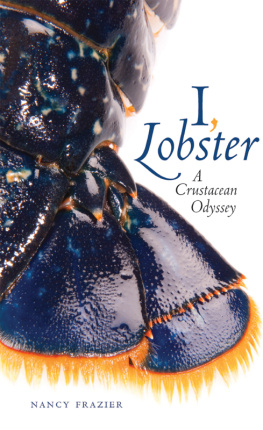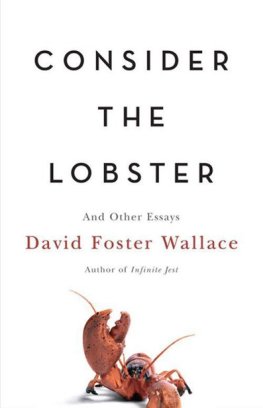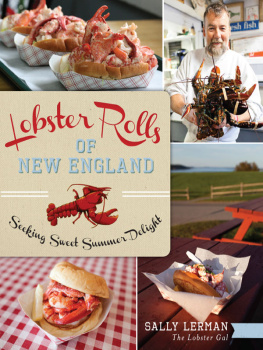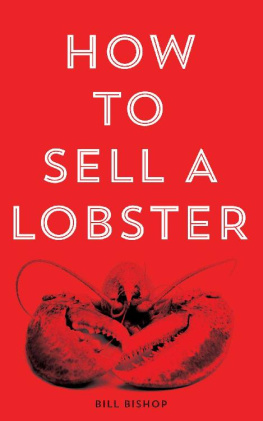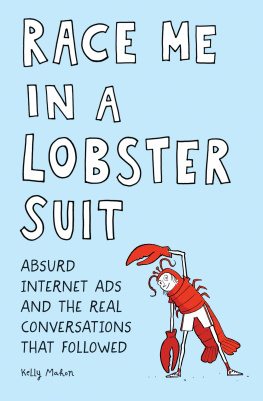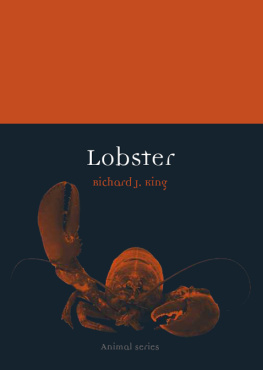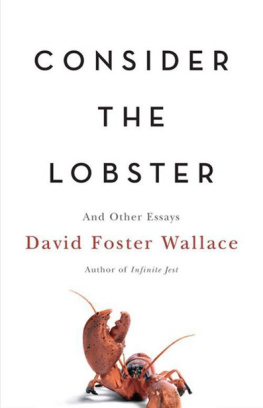Nancy Frazier - I, Lobster: A Crustacean Odyssey
Here you can read online Nancy Frazier - I, Lobster: A Crustacean Odyssey full text of the book (entire story) in english for free. Download pdf and epub, get meaning, cover and reviews about this ebook. year: 2012, publisher: University of New Hampshire Press, genre: Romance novel. Description of the work, (preface) as well as reviews are available. Best literature library LitArk.com created for fans of good reading and offers a wide selection of genres:
Romance novel
Science fiction
Adventure
Detective
Science
History
Home and family
Prose
Art
Politics
Computer
Non-fiction
Religion
Business
Children
Humor
Choose a favorite category and find really read worthwhile books. Enjoy immersion in the world of imagination, feel the emotions of the characters or learn something new for yourself, make an fascinating discovery.
- Book:I, Lobster: A Crustacean Odyssey
- Author:
- Publisher:University of New Hampshire Press
- Genre:
- Year:2012
- Rating:5 / 5
- Favourites:Add to favourites
- Your mark:
- 100
- 1
- 2
- 3
- 4
- 5
I, Lobster: A Crustacean Odyssey: summary, description and annotation
We offer to read an annotation, description, summary or preface (depends on what the author of the book "I, Lobster: A Crustacean Odyssey" wrote himself). If you haven't found the necessary information about the book — write in the comments, we will try to find it.
A consideration of the lobster in history, myth, art, literature, and cuisine.
I, Lobster: A Crustacean Odyssey — read online for free the complete book (whole text) full work
Below is the text of the book, divided by pages. System saving the place of the last page read, allows you to conveniently read the book "I, Lobster: A Crustacean Odyssey" online for free, without having to search again every time where you left off. Put a bookmark, and you can go to the page where you finished reading at any time.
Font size:
Interval:
Bookmark:
ACKNOWLEDGMENTS
Nina and Jim Scott unwittingly started me on the path to this book. They spend their summers in Friendship, Maine, and the rest of the year in Amherst, Massachusetts, where they frequently lead seminars for Five College Learning in Retirement of Western Massachusetts. When my husband, Jack, retired, he and I joined the Scotts terrific seminar on the subject of lobsters. The text for the course was The Secret Life of Lobsters, by Trevor Corson. Everyone in the seminar made a presentation on a lobster-related topic, and mine was a PowerPoint exhibit and discussion of lobsters in art. Who knew it would end this way!
The architectural historian Helen Searing, a cherished friend for over fifty years, not only gave me a unique rope necklace with dangling red lobsters, but she also put me on the trail of Salvador Dals Lobster Telephone. What a trip that turned out to be.
And how lucky I am to have a Milton scholar for a friend. A few years ago, when the geese were honking madly, Kathleen Swaim smiled and said, They are intelligent of seasons. I was puzzled. Then she said, Milton. The phrase tucked itself somewhere in my brain, buzzing now and then as the weather changed and geese were on the wing again, until the day I learned about the extraordinary marching formation of the migrating spiny lobsters, Panulirus argus. Then, thanks to Kathy, I found a Miltonic connection between lobsters and geese.
When Kathy and Margo Culleythe professor who shepherded me through my doctoral studies and a generous, constant friendvisited Maine over the years they brought me lobsters: on a cap or a T-shirt, in books, and masquerading as soft and fuzzy toys. Margo also brought back word of the unforgettable bumper sticker illustrated with a lobster and inscribed with the ironic double-entendre Say No to Pot!
Thanks to other friends for their gifts of everything from good ideas and help to tchotchkes: Ann Connolly; Sonia Sofield; Ann Grose; Jill Franks and her father, Lewis; Kathleen Scott; and Shirley Keech. Thanks to all the friends who tolerated my Decapoda obsession. I am grateful to family members, especially Jack, who have managedso far, at leastto survive the ups and downs of my life as a lobster. Special mention for my seven-year-old grandson, Davidcito, who is always on the lookout for lobster treasures, the most recent of which is a jaunty, magnetized specimen with antennae that jiggle whenever the refrigerator door is opened or closed.
The art historian John Varrianos book, Tastes and Temptations, introduced me to Zanino di Pietros Last Supper with lobsters. A year later, I met John for the first time. We had lunch at a local seafood restaurant and sat in a booth talking about art and books over lobster rolls. It was John who told me about the sixteenth-century recipe book by Bartolomeo Scappi, chef to Pope Pius V.
My neighbors in Maine, Nadia and Ron Colvin, introduced me to their friend Mark Wallace, a skilled and highly successful lobsterman who had been a member of Maines Lobster Advisory Council. Mark was generous with his time and answered my questions with patience and good humor. The marine biologists William Herrnkind, of Florida State University, and Carl Wilson, of the Maine Department of Marine Resources, also took time to give me valuable information.
Just as Kathys words from Milton enriched other discoveries, so did the observations of Craig Harbison, an art historian with whom I studied. In one of his classes, Craig mentioned the ancient question of infinite regress residing in the idea that the world rests on the back of a turtle that stands on another turtle ad infinitum. The turtles metamorphosed when I discovered Georg Hoefnagels fifteenth-century engraving of the world supported on the back of a lobster, which revealed the truth of the matter: its not turtles, its lobsters all the way down.
It was an honor to have my first lobster article, Salvador Dals Lobsters: Feast, Phobia, and Freudian Slip, published in Gastronomica, edited by Darra Goldstein.
I appreciate Steve Hull, my editor at the University Press of New England. His challenges greatly improved this book.
These are some of the high points of writing I, Lobster. The low point is that my agent, Ed Knappman, died unexpectedly and much too young, while I was writing this book.
Nancy Frazier

Consider the Cult of the Lobster
In the second century Pausaniasthe ancient Greek geographer, traveler, and authorwrote: The lobster was generally esteemed sacred by the Greeks and was not eaten by them; if the people of Seriphos caught a lobster in their nets they put it back into the sea; if they found a dead one they buried it and mourned over it as over one of themselves. These words took me by surprise. What could he possibly mean? Why was the lobster sacred? There is no clue in Pausanias or in other ancient writers, including Aelian, who earlier commented on this contention of the lobsters deification. It appears to be unchallenged. Surely an explanation should be available.
Seriphos is one of the Cyclades, a rough circle of some 220 islands in the Aegean Sea. Seriphos was visited by J. Theodore Bent, an English traveler who was born in 1852 and died from malarial fever just forty-five years later. Bent chronicled his explorations in archeological articles and in books that ranged from the Life of Giuseppe Garibaldi to travel guides with social commentary. In 1885 he published The Cyclades, or Life among the Insular Greeks. It sounded promising to me.
However, Bents book said nothing at all about the sacred lobster. Even worse, he wrote that of all the towns in the Greek islands he visited, Seriphos was the filthiest. The main street he described as a sewer, literally, and said it was occupied by pigs.recounts several Nereid myths that the islanders told him with conviction, but nothingnothing at allabout lobsters.
One legend that Bent did mention is that Seriphos is where Dana and Perseus washed up after being thrown into the waves. This story eventually led me to the only possible explanation I have found for the deification of the lobster on Seriphos.
A prophecy that the son of his then-childless daughter Dana would kill him led the king of Argos to imprison Dana in a bronze tower as a preventive measure. Foolish mannothing could deter the lustful Zeus when he set his mind on what he wanted. Transforming himself into a shower of gold, Zeus ravished Dana in her prison and impregnated her. She gave birth to a son she named Perseus. When the king learned he had a grandson, he ordered that mother and child be locked in a wooden trunk and cast out to sea.
A fisherman on Seriphos rescued the castaways, and Perseus grew up on that island. But then Danas beauty attracted the attention of the king of Seriphos, Polydectes, who determined to get rid of young Perseus in order to seduce his mother. Polydectes dispatched Perseus on a mission to kill Medusa, a gorgon (from the Greek word for dreadful) whose glance could turn anyone who looked at her to stone.
Perseus used a highly polished shield borrowed from Athena as a mirror so that he did not have to look directly at Medusa, and with her reflection to guide his aim, he succeeded in cutting off her head. Proudly he returned to Seriphos with his trophy, only to find his mother in the arms of Polydectes. In revenge Perseus held up Medusas head, directing its gaze at Polydectes and then at the entire island. So it was that Polydectes and his kingdom of Seriphos were transformed into the rocky, barren landscape Bent so disparaged (Perseus eventually, though unintentionally, killed his maternal grandfather in accordance with the prophecy). Even today Seriphos is one of the more desolate and least visited and appreciated of all the Greek islands.
Next pageFont size:
Interval:
Bookmark:
Similar books «I, Lobster: A Crustacean Odyssey»
Look at similar books to I, Lobster: A Crustacean Odyssey. We have selected literature similar in name and meaning in the hope of providing readers with more options to find new, interesting, not yet read works.
Discussion, reviews of the book I, Lobster: A Crustacean Odyssey and just readers' own opinions. Leave your comments, write what you think about the work, its meaning or the main characters. Specify what exactly you liked and what you didn't like, and why you think so.

